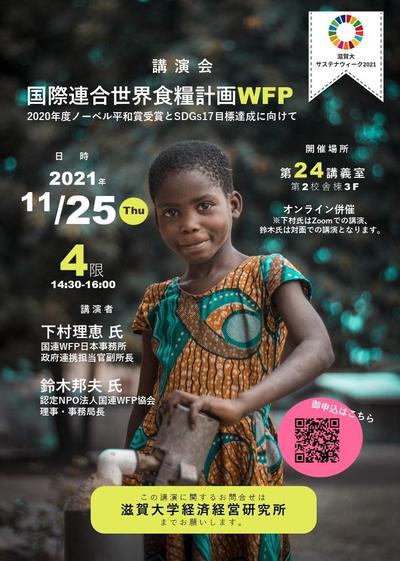※クリックすると拡大されます
日 時: 2021年11月25日(木)14:30-16:00![]()
![]()
報告論題:「国際連合世界食糧計画WFP 2020年度ノーベル平和賞受賞とSDGs17目標達成に向けて」
場 所:セミナー室Ⅰ(大)
開催様式:対面とオンラインの併催
参加申込み:下記ボタンよりお申込みください。
◆この講演会はプロジェクト科目B「Global Business」の関連講演会です。
◆下村氏はZoomでの講演、鈴木氏は対面での講演となります。
報 告 者: 下村理恵(国連WFP日本事務所政府連携担当官副所長)
報 告 者: 鈴木邦夫(認定NPO法人国連WFP協会理事・事務局長)
講演報告「2020年度ノーベル平和賞受賞とSDGs17目標達成に向けて」
下村 理恵様 国連 世界食糧計画WFP 日本事務所 政府連携担当官、副所長
鈴木 邦夫様 認定NPO法人国連WFP協会 理事・事務局長
世界最大の人道支援機関「国連世界食糧計画(以降WFPと表記)」及び日本での支援機関である「国連WFP協会」からのSDGsに対する取組みやノーベル平和賞受賞経緯についての講演を通じて、出席者は、グローバル規模で人道的SDGs目標を達成しようとする活動の実態やその意義に触れ、より広い視野でSDGs活動について考える機会を得た。
現在、地球上での飢餓人口は8.1億人で、その飢餓が発生する背景には、紛争・コロナ禍・天災・飢えと不平等・男女不平等・気候変動がある。この中で、WFPはSDG2「飢餓をゼロに」を主活動目標に掲げ、現在80か国で1.12億人へ人道支援を行っている。具体的には、WFPは 緊急食糧支援、食糧支援後の自立支援、学校給食の提供、栄養失調の撲滅等を進め、飢餓をゼロにすることを始点に、人々の自立を促し豊かで発展性のある社会の構築と拡大を目指す(SDG2から1,3,4,8,9,10等へ発展的な水平展開)。但し、飢餓がある限り終点はない。この発展的な水平展開の実績が世界的に高く評価され、WFPはノーベル平和賞を受賞することとなった。
「誰一人取り残さない」をモットーに、全世界で昨年1月よりSDGs17に関する「行動の10年」が始まった。これら17の指標其々に日本として達成すべき数値目標が政府より提示されているが、地域・産業・企業・他活動団体単位での具体的数値目標の配分がされていない(容易ではない)。その結果、多くの活動団体は各々の特質やESGに対する要求に応じてのみ行動を開始しているため、自団体に利益とならない指標への関心・関りの低下、それぞれの行動の持続性に対する不安、行動領域の偏りを事前に把握・是正することの難しさ等の問題や懸念が生じている。このような状況の中では、今現在を生きることすら困難な人々への人道支援が、我国で加速して行く可能性に確信を持てない。日本はその立場(G7国)にふさわしいバランスの取れた目標達成度を期待されているが、その為には、現状進行中の行動を強化させつつ、人道支援や人権尊重分野でも、より多くの人々からの直接的行動や幅広い支援を活発化させることができる社会体制の構築を、SDGsについての教育の強化(例:小学校低学年から)や新たな仕組みの導入(例:国による支援インセンティブ制)を通じて開始させるべきである。
私は、その変革、SX(ここでは"Society Transformation"。一般的には、"Sustainability Transformation"であるが、より大規模な変革という意味を込めて。) の第一歩はSDGsに対する視点や考え方を多角化させることである、と強く信じる。また、だからこそこのような行動を2030年末に終わらせてはならない。
今回、御多忙の中講演いただきました講師の下村氏と鈴木氏、開催に当たりご支援を賜りました滋賀大学内関係者の皆様はじめ全参加者に深謝致します。当日参加者数は、対面参加者48名・ZOOM参加者57名、合計105名でした。
(経済学部非常勤講師 安野信之)
WFP: The 2020 Nobel Peace Prize and Working Towards the Achievement of SDGs17
Rie Shimomura
Government Liaison Officer and Deputy Director, World Food Programme Japan Relations Office
Kunio Suzuki
Director and Secretary-general, Japan Association for the World Food Programme
Representative from the World Food Programme (WFP), the world's largest humanitarian organization, and Japan Association for the World Food Programme (JAWFP), the WFP's support agency in our country, gave lectures on their work to address SDGs and the story how the Nobel Peace Prize was awarded to WFP. They spelled out the realities and significance of the activities aimed at achieving the SDGs globally, which offered the audience opportunities to ponder on SDGs with broader perspectives.
Today, 810 million people on our planet face hunger caused by such factors as conflicts, the Covid-19 pandemic, natural disasters, food scarcity and inequality, gender inequality, and climate change. Under these adverse conditions, the WFP provides humanitarian aid to some 112 million people in 80 countries with the goal of attaining zero hunger, which is the key target of SDG 2. With hunger eradication as the starting point, the WFP aims to promote food security as it works to build and develop prosperous and progressive societies through implementing various projects, including emergency food assistance, post-food-aid programs to support self-reliance, school lunch programs, and malnourishment reduction programs. (the WFP's activities for SDG2 promote actions to achieve goals defined by SDG 1,3, 4, 8, 9, 10 and so on.) There is no end point to WFP's endeavors so long as hunger remains. These efforts to progressively achieve the SDG goals across various fields and sectors are highly appreciated around the world and resulted in the organization receiving the Nobel Peace Prize in 2020.
With the motto "No One Left Behind," the United Nations launched in January 2020 the Decade of Action campaign to meet the SDGs17 globally. The Japanese government set numerical targets for each of the 17 goals, but did not establish specific numerical targets for individual groups such as communities, industries, businesses, and other entities, which is admittedly a difficult task. So natually many organizations are pursuing only the targets relevant to the nature of their own activities or those that address the ESG challenges. Consequently, this situation unveils strong concerns about indifference and less involvement in goals that are not to their benefit, the sustainability of actions being currently taken, and detection and correction of imbalanced areas of action. The current situation does not inspire confidence that our country's humanitarian aid for those people struggling to merely survive each day will accelerate into the future.
As a member of the G7, Japan is expected to demonstrate balanced SDG achievements. To do that, our country needs to accelerate on-going activiies and simultaneously create societal systems that encourage more people to take direct action and stimulate broader support in humanitarian aid and human rights issues by strengthening education on SDGs, starting from lower primary school children and by adopting new measures such as government support incentive programs.
I call this social change "Society Transformation," or SX. (SX in general refers to "sustainability transformation," but I call it society transformation to indicate change on a much greater scale.) I strongly believe the first step of SX is adopting multi-dimensional perspectives and approaches towards the SDGs, and therefore these actions should not stop at the end of 2030.
I would like to take this opportunity to express my gratitude to Ms. Shimomura and Mr. Suzuki for taking time out of their busy schedules to give lectures. I am also thankful to the Shiga University staff who helped organize this event and to all the participants. The talks were attended by 105 audience members, 48 in person and 57 zoom viewers.
(Nobuyuki Yasuno, part-time lecturer, Faculty of Economics)
本ページに関するお問い合わせは
滋賀大学経済経営研究所
TEL : 0749-27-1047
FAX : 0749-27-1397
E-mail:ebr(at)biwako.shiga-u.ac.jp までお願いします。
★(at)を@に変更して送信してください。






